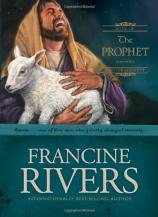The Prophet: Sons of Encouragement Series, Book Four
Review
The Prophet: Sons of Encouragement Series, Book Four
In Francine Rivers’s fourth of five novellas exploring the biblical men who are usually not considered the heroes of Sunday School flannelgraph stories, she unpacks the life of Amos, an Old Testament prophet, shepherd and fire-and-brimstone preacher calling for repentance who changed the history of the Israelite people and has significant words for Christians today. THE PROPHET follows Rivers’s other books in the Sons of Encouragement series: THE PRIEST (Aaron), THE WARRIOR (Caleb) and THE PRINCE (Jonathan). The series finishes with THE SCRIBE (Silas).
THE PROPHET opens with a shocking scene for westernized contemporary readers. Amos, the gentle and caring shepherd whose name means “burden bearer,” kills one of his flock who habitually leads the other sheep into danger, then lames another so it won’t wander off. “Sometimes I must wound in order to protect,” Amos tells a young lamb. Throughout the earlier pages of her story, Rivers makes allusions to Jesus’s parables of the lost lamb, as well as the beloved verses of the 23rd Psalm. Watch for the sheep/shepherd metaphors for the Christian life; they are in abundance throughout.
Rivers unfolds Amos’s growing anger at the corruption in God’s temple and his passion to do something that would set things right. However, the people of his time live in fear of the priests. “If you question their judgment, they will say you question God Himself,” Amos’s father tells him. “…No one would have anything to do with you….You would have to sell yourself into slavery.”
Amos, whose family sells the blemished lambs to the temple, wrestles with a dilemma. Should he question things he doesn’t understand? Weren’t the priest’s wealth and possessions a sign that God was pleased? Why would a righteous, holy God reward corrupt, scheming men who misused His name to gain riches for themselves? These are good questions that will spark discussion with contemporary Christian readers about life and faith today.
Rivers lets Amos’s anger and bitterness over the injustices of the priests grow until God speaks to him directly, giving him a vision of what is to come. Then, Amos completely changes the course of his life, giving up his love of the outdoors and of peace for years of living in the city, arguing and prophesying, and preaching the truth. Before he can be used by God, Amos must come to grips with his own pride and sinfulness. As Rivers unfolds the horrific, bloody visions of Amos, she also adeptly shows how Amos moves from a desire for revenge on his enemies to self-knowledge that he is, deep down, no different than they are.
Rivers then writes of how Amos begins life as a prophet, traveling to such places as the corrupt city of Bethel, to spread the vision of God’s anger toward his people. Unsurprisingly to even those who have never read the book of Amos, this is not welcome news. She does a good job showing what it must have been like for Amos to try and share with his family about his visions. Says one of Amos’s brothers: “Go home. Prophesy to your sheep.”
But there are gaps, some repetition and a few places where more of Amos’s life would be welcome and less of his prophecies. What did Amos look like? Did Amos ever feel love for a woman? (Rivers avoids this topic altogether, although she is expert in using sexual tension throughout her Lineage of Grace series). She tells us in several places, more than she shows us, about the events that transpire. However, there are some beautiful passages, such as this one, as Amos meditates on the folly of the Israelites going to worship idols: “Men without God put their trust in a spider’s web, not even knowing they had been captured and bound.”
Although this is fiction, Christian readers will discover within these pages a good reprise of a slice of Old Testament history. Those concerned with social justice issues will also find this an inspiring, passionate call for action by Christians in addressing both the disparity of resources between the poor and the wealthy, and corruption or power-seeking within the church. As Amos tells the temple priests, “I see those who prey on the poor, your rich women who eat like cows.”
A discussion and study guide at the end of the novel makes it suitable for book club or small group Bible study use as well.
Reviewed by Cindy Crosby on July 24, 2006











